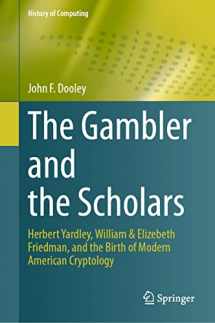
The Gambler and the Scholars: Herbert Yardley, William & Elizebeth Friedman, and the Birth of Modern American Cryptology (History of Computing)
Book details
Summary
Description
In May 1917, William and Elizebeth Friedman were asked by the U.S. Army to begin training officers in cryptanalysis and to decrypt intercepted German diplomatic and military communications. In June 1917, Herbert Yardley convinced the new head of the Army’s Military Intelligence Division to create a code and cipher section for the Army with himself as its head.
These two seminal events were the beginning of modern American cryptology, the growth of which culminated 35 years later with the creation of the National Security Agency. Each running their own cryptologic agencies in the 1920s, the Friedman-Yardley relationship was shattered after Yardley published a tell-all book about his time in military intelligence. Yet in the end, the work they all started in 1917 led directly to the modern American intelligence community. As they got older, they became increasingly irrelevant in the burgeoning American cryptologic fraternity.
Topics and features:
* Examines the lives of three remarkable and pioneering cryptologists
* Offers fascinating insights into spies, codes and ciphers, rumrunners, poker, and military history
* Sheds new light on interesting parts of the cryptologists’ careers―especially Elizebeth Friedman, whose work during World War II has just begun to be explored
* Recounts several good stories, i.e., What if the Friedmans had gone to work for Herbert Yardley in his new Cipher Bureau in 1919? What if Yardley had moved back to Washington to work for William Friedman a decade later?
This enjoyable book has wide appeal for: general readers interested in the evolution of American cryptology, American historians (particularly of World War I, the inter-war period, and World War II signals intelligence), and historians of―and general readers interested in―American military intelligence. It also can be used as an auxiliary text or recommended reading in introductory or survey courses in history or on the related topics.


We would LOVE it if you could help us and other readers by reviewing the book
Book review



